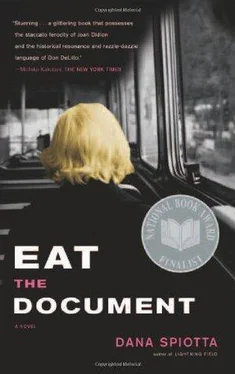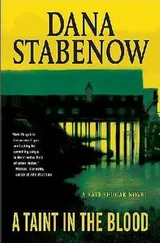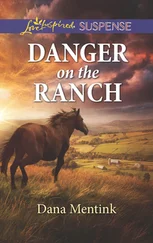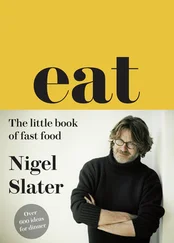Dana Spiotta - Eat the Document
Здесь есть возможность читать онлайн «Dana Spiotta - Eat the Document» весь текст электронной книги совершенно бесплатно (целиком полную версию без сокращений). В некоторых случаях можно слушать аудио, скачать через торрент в формате fb2 и присутствует краткое содержание. Год выпуска: 2006, Издательство: Scribner, Жанр: Современная проза, на английском языке. Описание произведения, (предисловие) а так же отзывы посетителей доступны на портале библиотеки ЛибКат.
- Название:Eat the Document
- Автор:
- Издательство:Scribner
- Жанр:
- Год:2006
- ISBN:нет данных
- Рейтинг книги:3 / 5. Голосов: 1
-
Избранное:Добавить в избранное
- Отзывы:
-
Ваша оценка:
- 60
- 1
- 2
- 3
- 4
- 5
Eat the Document: краткое содержание, описание и аннотация
Предлагаем к чтению аннотацию, описание, краткое содержание или предисловие (зависит от того, что написал сам автор книги «Eat the Document»). Если вы не нашли необходимую информацию о книге — напишите в комментариях, мы постараемся отыскать её.
shifts between the underground movement of the 1970s and the echoes and consequences of that movement in the 1990s. A National Book Award finalist,
is a riveting portrait of two eras and one of the most provocative and compelling novels of recent years.
Eat the Document — читать онлайн бесплатно полную книгу (весь текст) целиком
Ниже представлен текст книги, разбитый по страницам. Система сохранения места последней прочитанной страницы, позволяет с удобством читать онлайн бесплатно книгу «Eat the Document», без необходимости каждый раз заново искать на чём Вы остановились. Поставьте закладку, и сможете в любой момент перейти на страницу, на которой закончили чтение.
Интервал:
Закладка:
Dana Spiotta
Eat the Document
To Robert Spiotta and Emmline Frasca
PART ONE. 1972
By Heart
IT IS EASY for a life to become unblessed.
Mary, in particular, understood this. Her mistakes — and they were legion — were not lost on her. She knew all about the undoing of a life: take away, first of all, your people. Your family. Your lover. That was the hardest part of it. Then put yourself somewhere unfamiliar, where (how did it go?) you are a complete unknown. Where you possess nothing. Okay, then — this was the strangest part — take away your history, every last bit of it.
What else?
She discovered, despite what people may imagine, having nothing to lose is a lot like having nothing. (But there was something to lose, even at this point, something huge to lose, and that was why this unknown, homeless state never resembled freedom.)
The unnerving, surprisingly creepy and unpleasantly psychedelic part — you lose your name.
Mary finally sat on a bed in a motel room that very first night after she had taken a breathless train ride under darkening skies and through increasingly unfamiliar landscape. Despite her anxiety she still felt lulled by the tracks clicking at intervals beneath the train; an odd calm descended for whole minutes in a row until the train pulled into another station and she waited for someone to come over to her, finger-pointing, some unbending and unsmiling official. In between these moments of near calm and all the other moments, she practiced appearing normal. Only when she tried to move could you notice how shaky she was. That really undid her, her visible unsteadiness. She tried not to move.
Five state borders, and then she was handing over the cash for the room — anonymous, cell-like, quiet. She clutched her receipt in her hand, stared at it, September 15, 1972, and thought, This is the first day of it. Room Twelve, the first place of it.
Even then, behind a chain lock in the middle of nowhere, she was double-checking doors and closing curtains. Showers were impossible; she half-expected the door of the bathroom to push in as she stood there unaware and naked. Instead of sleeping she lay on the covers, facing the door, ready to move. Showers and bed, nakedness and sleep — she felt certain that was how it would happen, she could visualize it happening. She saw it in slow motion, she saw it silently, and then she saw it quickly, in double time, with crashes and splintered glass. Haven’t you seen the photos of Fred Hampton’s mattress? She certainly had seen the photos of Fred Hampton’s mattress. They’d all seen them. She couldn’t remember if the body was still in the bed in the photos, but she definitely remembered the bed itself: half stripped of sheets, the dinge stripe and seam of the mattress exposed and seeped with stains. All of it captured in the lurid black-and-white Weegee style that seemed to underline the blood-soak and the bedclothes in grabbed-at disarray. She imagined the bunching of sheets in the last seconds, perhaps to protect the unblessed person on the bed. Grabbed and bunched not against gunfire, of course, but against his terrible, final nakedness.
“Cheryl,” she said aloud. No, never. Orange soda. “Natalie.” You had to say them aloud, get your mouth to shape the sound and push breath through it. Every name sounded queer when she did this. “Sylvia.” A movie-star name, too fake sounding. Too unusual. People might actually hear it. Notice it, ask about it. “Agnes.” Too old. “Mary,” she said very quietly. But that was her real name, or her original name. She just needed to say it.
She sat on the edge of the bed, atop a beige chenille bedspread with frays and loose threads, in her terry-cloth bathrobe, which she’d somehow thought to buy when she got her other supplies earlier in the afternoon. She had imagined a bath as bringing some relief, and the sink into the robe afterward seemed important. She did just that, soaked in the tub after wiping it clean. Eyes trained on the open door of the bathroom, and careful not to splash, she strained to determine the origins of every sound she heard. She shaved her legs and scrubbed her hands with a small nailbrush, also purchased that day. She flossed her teeth and brushed her tongue with her new toothbrush. She tended to the usual grooming details with unusual attention: she knew instinctively that these details were very closely tied to keeping her sanity, or her wits, anyway. Otherwise she could just freeze up, on the floor, in her dirty jeans, drooling and sobbing until they came and got her. Dirt was linked to inertia. Cleanliness, particularly personal cleanliness, was an assertion against madness. It was a declaration of control. You might be in the midst of chaos, terrified, but the ritual of your self-tending radiated from you and protected you. That was where Mary figured a lot of people got it wrong. Slovenliness might be rebellious, but it was never liberating. In fact, she felt certain that slovenly and sloppy attention to personal hygiene surrendered you to everything outside you, all the things not of you trying to get in.
The TV on low, she looked but barely watched, hugging her knees toward her. Unpolished clean nails, uniform and smooth. Legs shaven and scented with baby oil, which looked greasy but smelled powdery and familiar. She inhaled deeply, resting her face on her knees and drawing her legs closer. She was a tiny ball of a human, wasn’t she? A speck of a being in the middle of a vast, multihighwayed and many-sided country, wasn’t she? Full of generic, anonymous and safe places just like this one.
She thought of famous people’s names, authors’ names, teachers’ names, the names she made up when she was eight for her future babies. Abby, Blythe, Valerie. Vita, Tuesday, Naomi. She put on an oversized T-shirt and clean cotton bikini briefs decorated with large pastel pansies, size 4. She thought of girlfriend names and cheerleader names. Names of flowers and women in novels. She ate peanut butter on white bread and drank orange juice directly from the carton. She was ravenous, very unusual for her. She took a large bite and a big swig, the sweet, pulpy taste mixing into the glutinous, sticky mouthful. She didn’t finish swallowing before taking another huge bite. Maybe I’ll be a fat person in my new life. She started to laugh, and the peanut butter — bread — orange juice clump stuck momentarily in her throat, cutting off her airway. She imagined, indifferently, choking and dying in this motel room. She swallowed and then laughed even harder, out loud. It sounded crazy, her short, sudden laugh against the quiet mono sound of the television. She could hear her breath squeeze in and out of her lungs and throat. She turned up the volume on the television and stared hard at it.
Jim Brown was talking to Dick Cavett. Brown wore a tight white jumpsuit with beige piping and a wide tan leather belt through the high-waisted belt loops. They both sipped something out of oversized mugs, also white, and placed them on a mushroom-shaped white metal table between them. Brown smiled handsomely and kept declaring — with exquisite enunciation — his respect and support for his friend, the president.
A piece of lined paper in a spiral notebook, a ballpoint pen. Karen Black. Mary Jo Kopechne. Joni Mitchell. Martha Mitchell. Joan Baez. Jane Asher. Joan isn’t so bad. Linda McCartney. Joan McCartney. Joan Lennon. Oh, good, sure. Bobby would appreciate that. She almost waited for him to contact her — but she knew he would not, not for a while, anyway. At eleven o’clock she turned the channel to watch the news, tried to see if he, or any of them, had been identified or arrested. Jane Fonda, Phoebe Caulfield, Valerie Solanas. She liked these names. Mustn’t reference her real name in any way. Brigitte, Hannah, Tricia. Just don’t get cute. Lady Bird. Pat. Ha.
Читать дальшеИнтервал:
Закладка:
Похожие книги на «Eat the Document»
Представляем Вашему вниманию похожие книги на «Eat the Document» списком для выбора. Мы отобрали схожую по названию и смыслу литературу в надежде предоставить читателям больше вариантов отыскать новые, интересные, ещё непрочитанные произведения.
Обсуждение, отзывы о книге «Eat the Document» и просто собственные мнения читателей. Оставьте ваши комментарии, напишите, что Вы думаете о произведении, его смысле или главных героях. Укажите что конкретно понравилось, а что нет, и почему Вы так считаете.












